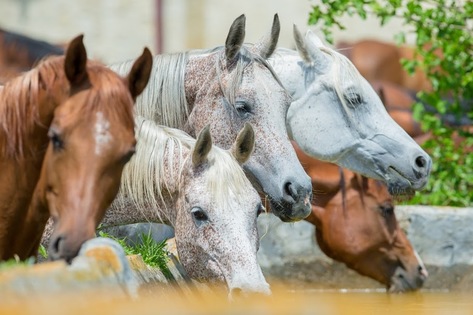
The Most Popular Horse Breeds Of 2019
Equestrian Advice & Guides General Equestrian
Build your business profile for FREE and expose your services to thousands of potential clients!
Create my profile now!
Horses are seemingly both indestructible and extremely fragile. They live for a long time, and yet not nearly long enough. Our horses work for us, play with us and act as the best therapists on the planet, and yet none of them plan for retirement or have a 401k or pay into Social Security.
There is no “retirement age” or any other parameter to determine when it’s time to be turned out to pasture. So how do you know when it’s time to retire your horse or even when to back down on the workload you expect from him? How do you know when your horse is over-worked, or too old, or no longer comfortable in his work schedule? Is it based on age? Breed? Conformation? Training? It’s actually all of those things and none of them. It’s an individual assessment made on how your horse is doing in the moment, how he feels, how stiff or sore his is, what ailments he’s living with and how those things are best managed.
As with all things horse-related, each case must be evaluated on an individual basis. Any horse that is not sound should be evaluated by a veterinarian to determine if he can still be ridden or worked in his usual capacity, or in a lesser one. If he is truly unsound, then retirement is usually a good option until his quality of life is diminished to the point that euthanasia is the only kind release you can offer.
But even with our sound horses, there does come a time when we need to ask less of them. And this can happen as young as age three or as old as age forty-three. For those who bred or raised their horses, or who have owned them for most of their lives, the knowledge of that animal’s past history is known—from how old he was when started, to what he was fed while in-utero to what his work history entailed. Knowing these things helps us gage what is going on when the horse begins showing his years and helps determine the best management methods to follow to allow him to be happily working in his golden years. Consulting your veterinarian and trainer for their informed opinions are good places to start when considering retiring your horse.
In general, retirement for a horse doesn’t have to mean he sits around watching TV and drinking beer or traveling the world, but it does mean a lesser amount of the hard work we demand of him when he’s younger. The harder his workload when young means he likely will have arthritic changes earlier than you hoped, and slowing down on the jumping, sharp turns, steep trails or speed events may help him still carry on a productive life.
If you do retire your horse and he’s still showing, don’t just toss him into a pasture with others if he’s never had that lifestyle before. Remember to help him adjust and get used to new routines just as you would have to if it were you retiring. Keeping in some sort of exercise will help his mind and his body and he’ll maintain a better overall physical condition and mental attitude. The mind of the horse is as much in need of stimulation as his body!
In my own training career, I’ve found that horses tend to do best when not thrown to the side in a sedentary lifestyle, but rather when they continue working to some degree. Maybe riding a little bit less strenuously is all he needs, or a lighter rider to carry into a slower, easier new discipline. A horse is never too old to learn new things!
You’ll most likely need to adjust your recently retired horse’s feed to match his or her new, lower activity level. Carrying extra weight will put stress on joints, bones, ligaments and tendons, but it can also lead to metabolic diseases or hoof problems. Your farrier visit schedule may need to be changed, shoes may need to be removed and you may be able to back off on certain vaccinations such as equine influenza. Your horse may need dental evaluations more frequently as he ages and he may need softer food.
The thing not to do when considering an aged or unsound horse: Do NOT take to auction unless you don’t care what kind of horribly terrifying ending he’ll meet at a meet factory in either Canada or Mexico. No horse deserves anything less than our upmost respect, care and consideration, right up to the end. If you cannot afford to humanely euthanize your horse, most states have rescues that will happily help with the expense to do right by your horse. Just Google search and you’ll be surprised what help exists. Stay with your horse as he’s put to sleep; you are his safety net and he’ll go easier with you there. If you can’t be, see if a friend will stand in for you. This serves two purposes; a final goodbye for both of you, and the satisfaction that what you thought would happen with your horse, is what happened.
The take home message here is to remember to adjust according to what your horse needs to keep his mind, body and spirit happy. In his retirement, he will like having his friends around and he’ll be happier feeling needed, just as humans do and we can all enjoy our Horses, Happily Ever After!
~Tanya Buck
HorsesHappilyEverAfter.com
FREE ART today! Get it here: https://lp.constantcontactpages.com/su/eC0xLCH/HuggingHorseArt

